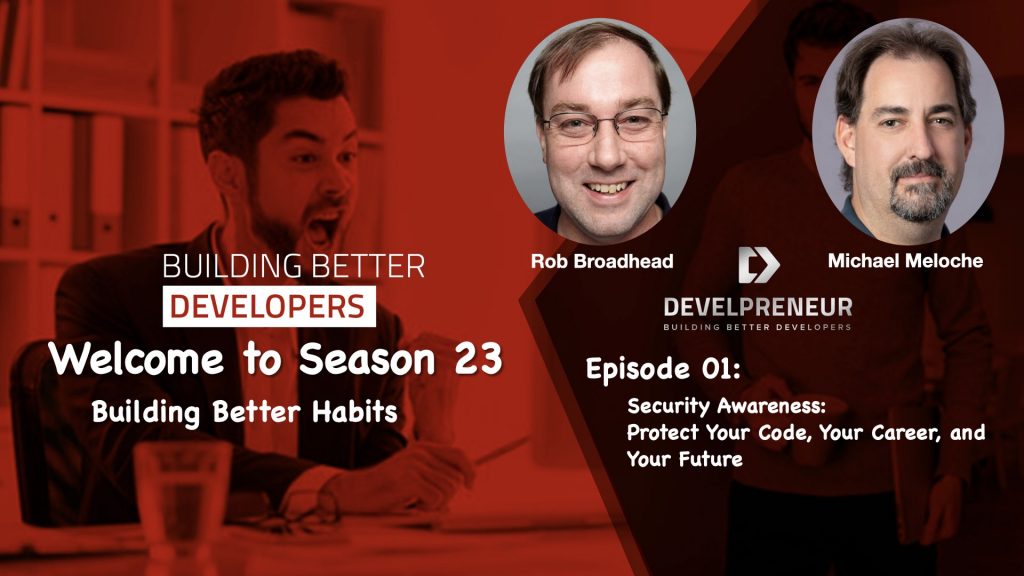Season 23 of the Building Better Developers podcast kicks off with a focus on building better habits. The first episode covers a critical topic for developers and tech enthusiasts: security awareness. Hosted by Rob Broadhead and Michael Meloche, the episode stresses the need for vigilance. In today’s rapidly evolving digital world, staying aware is more important than ever.
A Shift Toward Actionable Advice
The hosts emphasize that this season will be more actionable than ever. Unlike the last season that focused on the developer journey, Season 23 targets building better habits. These habits promote more effective and responsible development practices. Each episode will cover specific skills, tools, or behaviors. Developers will learn how to integrate these into their daily routines. Security awareness, the focus of this episode, is a vital habit. It directly impacts both personal and professional data security.
Action Item: schedule at least 30 minutes to explore security awareness. Use a search engine to find security awareness tools or vendors, many of which offer free content or trial periods. This will help you stay updated on the latest scams and security threats.
Why Security Awareness is Crucial
Security threats are more common than ever. Phishing scams and social engineering are just a few hacker tactics. Hackers have many methods to exploit vulnerabilities. Rob explains that developers may feel confident spotting threats. However, even tech-savvy individuals can fall for well-executed scams. Security awareness isn’t just for IT professionals; it’s for everyone. Those in technical fields may assume they’re immune, but they’re not.
Rob shares a story to illustrate the importance of security awareness. He received a suspicious email from what appeared to be a legitimate state tax office. At first, it seemed like a scam. After thorough research and contacting the organization, it turned out to be a valid notice. This example shows that, even when cautious, it’s crucial to verify suspicious communications before taking action.
Taking Security Awareness Seriously
Instead of a daily habit challenge, Rob suggests scheduling regular security check-ins. He recommends doing this throughout the year. Set aside time every few months to review your security posture. This includes both personal and organizational security. These check-ins could involve:
- Updating passwords
- Reviewing email security alerts
- Exploring the latest security awareness tools or vendors
Rob notes that many security awareness vendors offer free resources or trial periods. These vendors frequently update their content with the latest scam and threat information, making it easier to stay informed. He mentions well-known providers like KnowBe4, Mimecast, and INFOSEC. All of these offer accessible programs to help individuals and organizations stay current on emerging threats.
Key Steps for Developers
Michael offers valuable insights by suggesting developers use secure password managers like KeePass or LastPass. These tools help store credentials safely. He stresses the importance of regularly reviewing and updating passwords, especially for financial accounts. Michael warns against reusing passwords across different platforms. This common mistake can lead to widespread vulnerability if one account is compromised.
Another key security tip is to use multi-factor authentication (MFA) whenever possible. Rob and Michael both agree that MFA provides an essential layer of protection. It helps prevent unauthorized access, even if login credentials are compromised.
For businesses, Michael advises checking industry-specific security requirements to ensure compliance with regulations. This is especially important in sectors like healthcare and finance, where security breaches can have legal and financial consequences.
The Role of Technology in Building Better Security Awareness Habits
Developers are uniquely positioned to integrate security into their daily work. Whether implementing MFA in an app or securing dependencies with tools like OWASP, security should be a habit—not an afterthought. Rob emphasizes that even if security isn’t your main focus, regular check-ins are essential. Ongoing education can help prevent security vulnerabilities from becoming serious issues.
Rob shares additional resources for developers looking to improve their security practices. Tools like OWASP help developers identify and fix vulnerabilities in third-party dependencies, integrating security into the development process. For more structured programs, vendors like INFOSEC and NinjaO offer comprehensive security awareness training tailored for both businesses and developers.
Final Thoughts
The episode encourages developers to adopt security habits as part of their routine. Rob and Michael suggest starting with simple steps. Subscribe to security awareness vendors and set regular reminders for security reviews.
Security awareness is an ongoing responsibility. Staying informed and vigilant protects both personal data and organizational systems. As Season 23 progresses, more practical advice will be shared. This guidance will help you build essential habits to enhance your career and safeguard your future.
Stay Connected: Join the Developreneur Community
We invite you to join our community and share your coding journey with us. Whether you’re a seasoned developer or just starting, there’s always room to learn and grow together. Contact us at [email protected] with your questions, feedback, or suggestions for future episodes. Together, let’s continue exploring the exciting world of software development.

